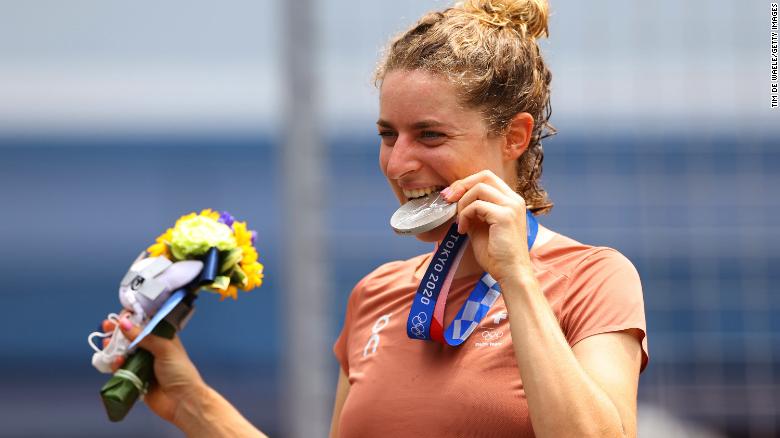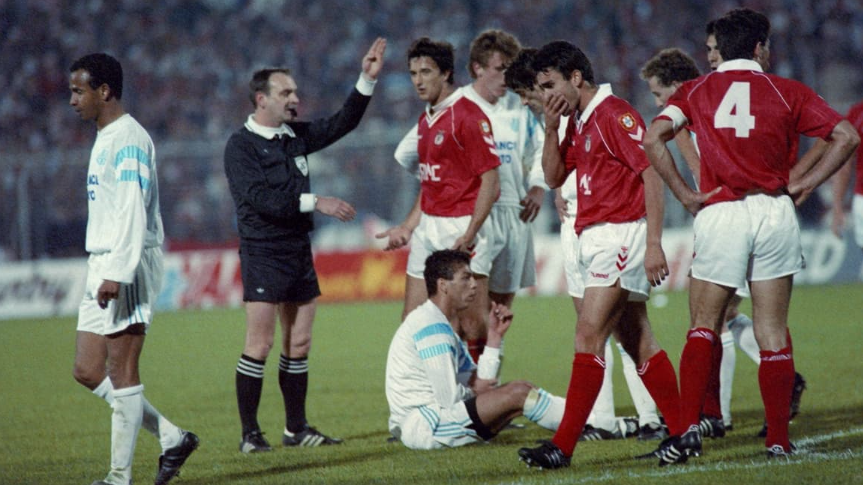The first medals and records arrived in Tokyo 2020 2:07
(CNN) -
The jubilant image of an Olympian standing atop the podium after emerging victorious in his discipline with a gold medal between his teeth is iconic.
We have already seen it numerous times at the Tokyo 2020 Olympics, in a host of disciplines.
Tokyo 2020 Olympic Games: live results and the new Olympic medals
The official Tokyo 2020 tally went even further on Sunday to try to remind people that medals are not, in fact, edible.
Bronze medalists Matteo Castaldo, Marco di Costanzo, Matteo Lodo and Giuseppe Vicino from Italy bite down on their medals during the medal ceremony.
"We just want to officially confirm that the # Tokyo2020 medals are not edible," he said.
"Our medals are made from recycled material from electronic devices donated by the Japanese public. So you don't have to chew on them ... but we know you still will."
But why do these victorious athletes decide to celebrate their coronation by pretending to take a bite out of their gold medals?
advertising
David Wallechinsky, a member of the Executive Committee of the International Society of Olympic Historians, told CNN in 2012 that it is likely an attempt to satisfy the media.
"It has become an obsession for photographers," says Wallechinsky, co-author of "The Complete Book of the Olympics."
"I think they see it as an iconic take, as something that you can probably sell. I don't think it's something that athletes would probably do on their own."
Swiss cyclist Marlen Reusser poses for a photo and bites off her silver medal after the women's individual time trial.
However, the phenomenon is not unique to the Olympics.
PHOTOS |
Latinos with medal at the Tokyo Olympics
Tennis superstar Rafael Nadal has become famous for looking like he wants to rip off a piece of the trophies he wins, notably the Coupe des Mousquetaires, the men's French Open trophy with which he has become so familiar.
Nadal bites into the Coupe des Mousquetaires after victory at the French Open.
A safe place
Victorious athletes from across the Olympic spectrum have done their best to find a place for their medals.
Team Britain's Tom Daley, who won the men's 10-meter synchronized diving competition with teammate Matty Lee on Monday, wove a bag to keep his gold medal safe while in Tokyo.
Daley, who crocheted during the coronavirus pandemic, posted on Instagram that she had created the stand to "prevent scratching."
Slovenian cyclist Primoz Roglic, who won gold in the men's individual time trial, admitted that the medal itself surprised him.
"It's actually quite heavy, but it's beautiful. I'm super proud and happy," he told the media.
In 2008, US soccer player Christie Rampone told the Tampa Bay Times that her medal collection was hidden among the pots and pans at home, as she believed they would be the last places anyone could search.
Athletes who have had to leave the Olympic Games due to covid-19
During his early days at the Olympics, Michael Phelps devised some innovative methods of transporting his medals.
In an interview on "60 Minutes" with Anderson Cooper in 2012, Phelps said that he kept his eight gold medals from the 2008 Beijing Games in a travel makeup case wrapped in a gray T-shirt.
Gold medalist Lasha Bekauri of Georgia nibbling his award during the medal ceremony for the men's -90 kg judo competition.
Since he is the most decorated Olympian of all time with a total of 28 medals, Phelps may have to adopt a new method of storing them.
However, not all athletes have held onto their Olympic memories.
Superstar boxer Wladimir Klitschko told CNN that he sold the gold medal he won at the 1996 Atlanta Games for $ 1 million, and earmarked the funds for the Klitschko Brothers Foundation, a charity created by him and his brother Vitali. to help poor children in his native nation of Ukraine.
"We care about education and sports, that is the key in the life of any child," said Wladimir.
"If they have knowledge, they can be successful with that in their adult life and sport gives them the rules: how to respect their opponent, how to respect the rules.
"It's always like this in life, you go down but you have to get up, and sport teaches you this great lesson."
American swimmer Anthony Ervin auctioned his 2000 Olympic gold medal on eBay to help survivors of the 2004 Indian Ocean tsunami.
Medals









